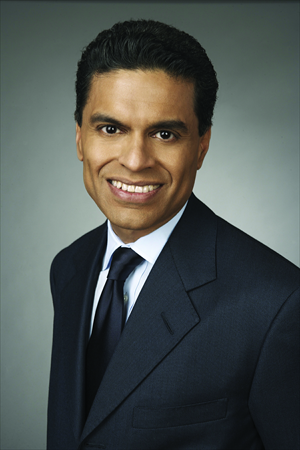American dream no option for China

Editor's Note:
China-US relations, one of the most prominent bilateral relationships in the world, are set for further development. As a rising power, China still faces many issues internally and externally. What position will China take in the Sino-US relationship? How will China grow to become another "superpower?" And what will the international system look like in the future? Fareed Zakaria (Zakaria), a renowned journalist specializing in international relations and the host of CNN's popular show Fareed Zakaria GPS, shared his ideas in an interview with Global Times (GT) reporter Liu Zhun.
GT: China is widely expected to become the world's other superpower, but you have said China is not one yet. You also pointed out that "when China starts acting like a superpower, the US should treat it like one." How will China become a superpower? Why would the US embrace it?
Zakaria: There is no doubt that China has seen massive success in its own development in the previous 35 years. Its achievement in curbing poverty and raising the living standards of its population has won a lot of admiration. However, the reality is China is still a middle-income country in the process of modernization.
In order to become a superpower, China needs to change its mentality, knowing that a truly global power considers issues in a wider scope which should be beyond its borderline. It should be noted that a real global power is always an ultimate provider of common and public good.
As for the US, embracing China's rise is the best choice. Unlike the old fashion which looked at competitiveness instead of cooperation, the current international relations are pursuing more cooperation because the world economy has become so closely intertwined.
We both benefit from each other's development. Joint interests intrigue us to strive for cheap energy and explore more space for cooperation. This is also the same case for US-China relations.
GT: Chinese President Xi Jinping has promoted the building of a new type of relationship, which means a new cooperative framework will be established. What do you think of Xi's proposal and why do we need a new framework?
Zakaria: President Xi is very thoughtful, and genuinely understands China and the US should develop a cooperative relationship. I think he has much of his political capital invested in this.
His promotion is exactly like a strategy, but this strategy can only succeed based on persistence. We need years to see the results, but his idea is absolutely right.
Before we talk about the new framework, we should know that the reality that constituted the old framework is no longer true.
The reality was that China had been a much poorer country, and there was a dramatic inequality in US-China relations. But the power possession of both countries has changed.
The US and China need to make conversations in a frank and equal manner.
There should be open areas for disagreement and more open areas for cooperation.
Top policymakers of both sides should be aware of the importance of building a reciprocal system.
GT: China's peaceful rise is a hotly debated topic around the world. What do you think of China as a peacefully rising power?
Zakaria: There is no doubt that China's rise has caused some nervousness not even in its neighboring countries, but in Europe and the US. This is mainly because historically, the rise of a major power has always produced international tension, because it arrives into an existing power structure.
However, the 21st century will be different because peace is largely connected with economic prosperity, which has been given the No.1 position by most countries.
When facing conflicts, a peaceful solution has always become a unanimous choice.
China's rise might unavoidably cause unease, but concerns about a hegemonic China are alarmist.
What's more, President Xi's advocacy of the Chinese dream can also demonstrate that China is still focusing on its internal development.
Expanding influence or even being a dominant power like what the American dream aims at is not China's option. The Chinese dream will contribute to China's peaceful rise.
GT: The Edward Snowden affair has become a new touchstone in China-US relations. What should both countries do when dealing with such cases?
Zakaria: The new technological revolution has brought massive changes into our lives and at the same time incurred numerous frictions between countries. I think the Snowden incident is a good alert for both countries, and also for the rest of the world, that cyberspace is in dire need of principles.
Surveillance might be an effective way to maintain national security, but what should be monitored and how it is conducted need to be clearly defined.
As for the impact on US-China relations, I think the best strategy is to maintain a close high-level contact and an ongoing strategic dialogue.
GT: With the "rise of the rest," as you mentioned in your latest bestseller The Post-American World, what kind of hierarchy will the future international order take?
Zakaria: This world is called a post-American world because I don't think we are living in a world with the US as the dominant power.
There are two scenarios.
One is that China and the US become the two superpowers in the world, and the future order will be a two-polar one. The other one is that several countries in different regions will thrive and constitute a multi-polar order, each country having their own strengths and weaknesses.
I am inclined to the second scenario, because one of the biggest changes that is happening is the rise of confidence and pride that every country is taking.
Certain regional countries are expanding their influence. I would not say this will definitely be a multi-polar world, but every country should be given a certain amount of space and respect.